Greece希腊英语介绍
希腊旅游英语作文
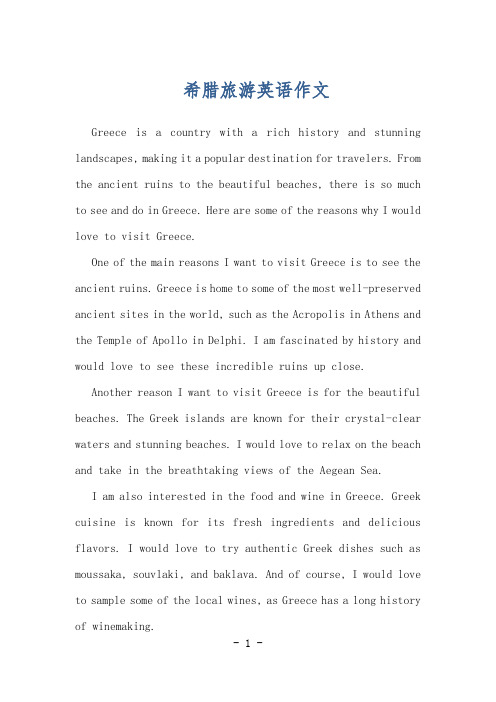
希腊旅游英语作文Greece is a country with a rich history and stunning landscapes, making it a popular destination for travelers. From the ancient ruins to the beautiful beaches, there is so much to see and do in Greece. Here are some of the reasons why I would love to visit Greece.One of the main reasons I want to visit Greece is to see the ancient ruins. Greece is home to some of the most well-preserved ancient sites in the world, such as the Acropolis in Athens and the Temple of Apollo in Delphi. I am fascinated by history and would love to see these incredible ruins up close.Another reason I want to visit Greece is for the beautiful beaches. The Greek islands are known for their crystal-clear waters and stunning beaches. I would love to relax on the beach and take in the breathtaking views of the Aegean Sea.I am also interested in the food and wine in Greece. Greek cuisine is known for its fresh ingredients and delicious flavors. I would love to try authentic Greek dishes such as moussaka, souvlaki, and baklava. And of course, I would love to sample some of the local wines, as Greece has a long history of winemaking.In addition to the historical sites, beaches, and food, I am also drawn to the natural beauty of Greece. From the rugged mountains to the lush valleys, there is so much to explore in the Greek countryside. I would love to go hiking and see the diverse landscapes that Greece has to offer.Overall, I am drawn to Greece because of its rich history, stunning landscapes, delicious food, and warm hospitality. I can't wait to experience everything that Greece has to offer.希腊是一个历史悠久、风景秀丽的国家,是旅行者的热门目的地。
古希腊风景介绍英文作文
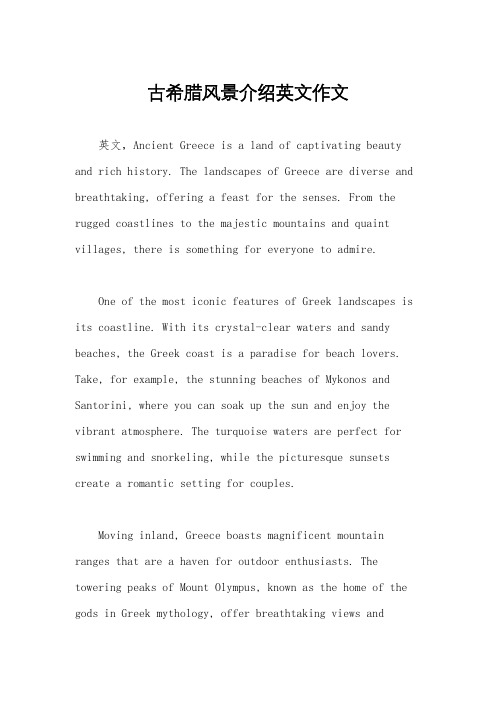
古希腊风景介绍英文作文英文,Ancient Greece is a land of captivating beauty and rich history. The landscapes of Greece are diverse and breathtaking, offering a feast for the senses. From the rugged coastlines to the majestic mountains and quaint villages, there is something for everyone to admire.One of the most iconic features of Greek landscapes is its coastline. With its crystal-clear waters and sandy beaches, the Greek coast is a paradise for beach lovers. Take, for example, the stunning beaches of Mykonos and Santorini, where you can soak up the sun and enjoy the vibrant atmosphere. The turquoise waters are perfect for swimming and snorkeling, while the picturesque sunsets create a romantic setting for couples.Moving inland, Greece boasts magnificent mountain ranges that are a haven for outdoor enthusiasts. The towering peaks of Mount Olympus, known as the home of the gods in Greek mythology, offer breathtaking views andchallenging hiking trails. Exploring the mountain villages nestled among the hills provides a glimpse into traditional Greek life, where locals welcome visitors with warm hospitality and delicious cuisine.In addition to its natural beauty, Greece is also hometo a wealth of historical sites that showcase its rich cultural heritage. The ancient ruins of Athens, including the Acropolis and Parthenon, stand as a testament toGreece's illustrious past. Walking through these ancient sites, you can't help but feel awestruck by thearchitectural wonders and the stories they tell of a bygone era.中文,古希腊是一个充满迷人美景和丰富历史的国度。
希腊文明英文作文

希腊文明英文作文Ancient Greece: The Cradle of Western Civilization。
Greece, a land steeped in legend and the birthplace of Western civilization, has left an enduring legacy that continues to shape the world today. From its towering temples and marble sculptures to its philosophical thought and literary masterpieces, Greece has made unparalleled contributions to human history and culture.Origins and the Bronze Age:The origins of Greek civilization can be traced to the Neolithic period, around 6000 BC. The Bronze Age, which began around 3000 BC, marked a significant turning point, as Greeks developed advanced metalworking techniques and established prosperous trading networks throughout the Mediterranean region.The Minoan and Mycenaean Civilizations:Two major civilizations flourished in Greece during the Bronze Age: The Minoans on the island of Crete and the Mycenaeans on the mainland. The Minoans were renowned for their advanced maritime skills, elaborate palaces, and exquisite pottery. The Mycenaeans, meanwhile, developed a powerful warrior culture and controlled much of mainland Greece.The Dark Ages and the Rise of City-States:The Bronze Age collapse around 1200 BC ushered in a period known as the Dark Ages, during which Greece experienced political and social upheaval. However, fromthe 8th century BC onwards, Greek city-states, known as poleis, began to emerge. These independent city-states were often fierce rivals, yet they also shared a common language, culture, and religious practices.The Classical Period:The classical period, from the 5th to the 4th centuriesBC, was the golden age of Greek civilization. Athens, the leading city-state, became a center of philosophy, literature, and the arts. Philosophers such as Socrates, Plato, and Aristotle laid the foundations of Western thought. Playwrights like Aeschylus, Sophocles, and Euripides created monumental tragedies and comedies. Sculptors like Phidias and Praxiteles crafted awe-inspiring statues.The Hellenistic Period:The death of Alexander the Great in 323 BC marked the beginning of the Hellenistic period. Greek culture spread throughout the Mediterranean region, and new cities such as Alexandria in Egypt and Antioch in Syria emerged as centers of learning and culture. Science, mathematics, and astronomy flourished in this period, with scholars such as Euclid, Archimedes, and Hipparchus making significant advancements.The Roman Conquest and the Byzantine Empire:Greece was conquered by Rome in 146 BC, becoming a province of the Roman Empire. However, Greek culture continued to influence Roman civilization, particularly in the areas of philosophy, literature, and the arts. Afterthe division of the Roman Empire in 395 AD, Greece became part of the Byzantine Empire, a Christianized successor state.Legacy and Influence:The legacy of ancient Greece is immense. Its democratic ideals, philosophical thought, and artistic masterpieces continue to shape modern societies. The Greek language became the lingua franca of the Eastern Mediterranean andthe basis for many modern languages. Greek mythology, literature, and philosophy have inspired and influenced countless artists, writers, and thinkers throughout history.中文回答:古希腊,西方文明的摇篮。
Greece 希腊介绍 (原创)
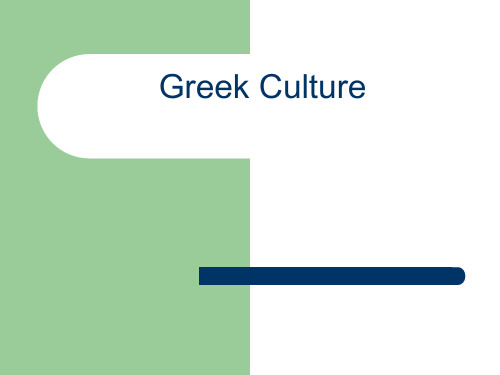
The Map of Ancient Greece
Social and Political Structure
a. Politics: Athens was a democracy. Democracy means ―exercise of power by the whole people.‖ But ―the whole people‖ the Greeks meant only the adult male citizens. b. Economy: the economy of Athens rested on an immense amount of slave labour, Farm, workshop and c. Sports: Greeks loved sports.A big festival on Olympus Mount once every 4 year ---- Olympic Games.Modern Olympic Games revived in 1896.
Philosophy and Science
The ancient Greeks were curious about many things, including what made the universe. They had the spirit of free enquiry and were quite ready to drop established ideas, to speculate, to use their imagination anቤተ መጻሕፍቲ ባይዱ to form their own conclusions. They were also not afraid to speak their minds. Pythagoras 毕达哥拉斯(about 580 --- 500 B.C.) had the idea that all things were number. Heracleitue 赫拉克利特(about 540 --- 480 B.C.) believed fire to be the primary element of the universe He also said: You cannot step twice into the same river. The sun is new everyday Democritus 德谟克利特(about 460 --- 370 B.C.) speculated about the atomic structure of matter. He was one of the earliest exponents of the atomic theory.
Greece 英文介绍希腊神话、爱琴海
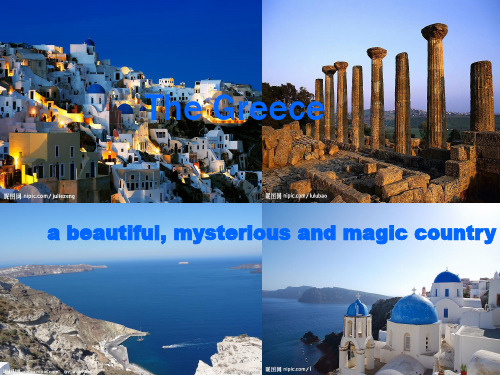
In the beginning, the universe is a cosmos evolving from Chaos. Chaos and Gaea (the earth) generate everything that exists, including seas, mountains, gods and monsters. Then Gaea’s mating with her son Uranus (the sky), which produces 12 Titans with Gronus as their leader.
Hestia(赫斯提亚): the goddess of the Hearth(灶台).
Ares(阿瑞斯):
the god of war.
Hermes(赫尔墨斯): the god of thieves and commerce.
Hephaestus(赫斯菲托斯): the god of fire and the forge(熔炉).
Aegean Sea --A Pure Paradise
Aegean Sea is full of the atmosphere of romantic, located to the west of Turkey and the east of Greece, connecting with the Mediterranean Sea(地中海 ).
The sea is brilliant blue, so is the sky; ehe residences on the island far away are painted into the same blue, bringing people a sudden enlightenment and joy. This, is Aegean Sea, which is described by Homer as “the color of fullbodied wine”.
介绍希腊的英语作文
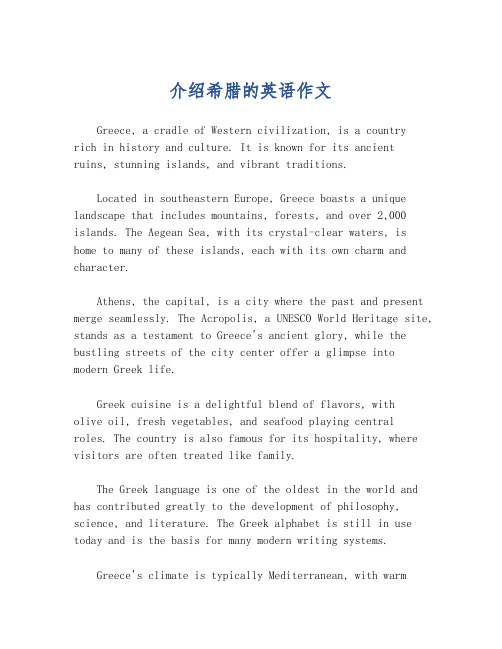
介绍希腊的英语作文Greece, a cradle of Western civilization, is a countryrich in history and culture. It is known for its ancient ruins, stunning islands, and vibrant traditions.Located in southeastern Europe, Greece boasts a unique landscape that includes mountains, forests, and over 2,000 islands. The Aegean Sea, with its crystal-clear waters, is home to many of these islands, each with its own charm and character.Athens, the capital, is a city where the past and present merge seamlessly. The Acropolis, a UNESCO World Heritage site, stands as a testament to Greece's ancient glory, while the bustling streets of the city center offer a glimpse into modern Greek life.Greek cuisine is a delightful blend of flavors, witholive oil, fresh vegetables, and seafood playing central roles. The country is also famous for its hospitality, where visitors are often treated like family.The Greek language is one of the oldest in the world and has contributed greatly to the development of philosophy, science, and literature. The Greek alphabet is still in use today and is the basis for many modern writing systems.Greece's climate is typically Mediterranean, with warmsummers and mild winters. This makes it an ideal destination for tourists seeking sun, sea, and relaxation.From the ancient myths and legends to its modern-day allure, Greece continues to captivate the world with its timeless beauty and rich heritage. Whether you're exploring ancient temples or enjoying the local cuisine, a visit to Greece is an unforgettable experience.。
介绍古希腊历史英语作文
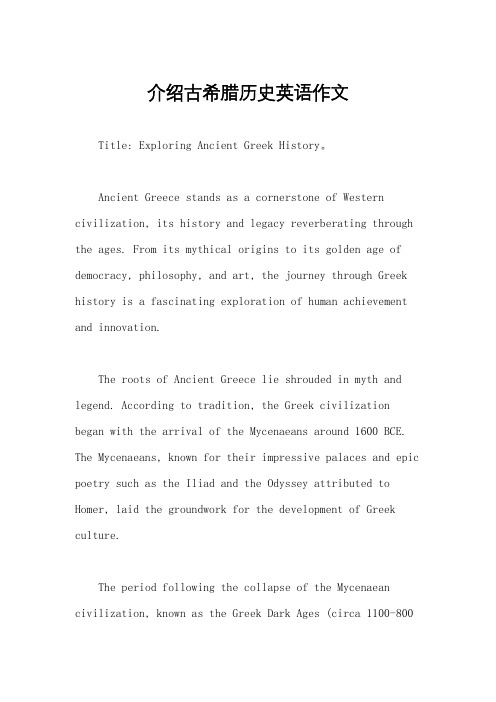
介绍古希腊历史英语作文Title: Exploring Ancient Greek History。
Ancient Greece stands as a cornerstone of Western civilization, its history and legacy reverberating through the ages. From its mythical origins to its golden age of democracy, philosophy, and art, the journey through Greek history is a fascinating exploration of human achievement and innovation.The roots of Ancient Greece lie shrouded in myth and legend. According to tradition, the Greek civilization began with the arrival of the Mycenaeans around 1600 BCE. The Mycenaeans, known for their impressive palaces and epic poetry such as the Iliad and the Odyssey attributed to Homer, laid the groundwork for the development of Greek culture.The period following the collapse of the Mycenaean civilization, known as the Greek Dark Ages (circa 1100-800BCE), was marked by a decline in population, literacy, and overall societal complexity. However, it also laid the foundation for the emergence of the Greek city-states, or polis, which would come to define the political landscape of ancient Greece.The Archaic Period (circa 800-500 BCE) witnessed the rise of city-states such as Athens and Sparta. Athens, with its democratic experiments under leaders like Solon and Cleisthenes, became a beacon of political innovation. Meanwhile, Sparta developed a militaristic society focused on discipline and prowess in battle.The pinnacle of Greek civilization is often associated with the Classical Period (circa 500-323 BCE). This era saw the flourishing of arts, philosophy, and literature. In Athens, the democratic system reached its zenith under the leadership of statesmen like Pericles, while intellectual giants like Socrates, Plato, and Aristotle laid the foundations of Western philosophy. The art of this period, epitomized by the sculptures of Phidias and the dramas of Aeschylus, Sophocles, and Euripides, still captivatesaudiences today.However, the glory of the Classical Period was not without its challenges. The Persian Wars (499-449 BCE) saw Greek city-states unite against the mighty Persian Empire, culminating in victories at Marathon, Thermopylae, and Salamis. These conflicts solidified Greek identity and inspired future generations with tales of valor and heroism.The aftermath of the Persian Wars ushered in a periodof conflict and upheaval known as the Peloponnesian War (431-404 BCE), pitting Athens and its allies against Sparta and its allies. The war, chronicled by Thucydides, highlighted the perils of unchecked ambition and thefragility of alliances. Despite its eventual defeat, Athens remained a cultural and intellectual powerhouse in the wake of the war.The Hellenistic Period (circa 323-31 BCE) witnessed the spread of Greek culture throughout the Mediterranean world following the conquests of Alexander the Great. Greek language, art, and philosophy became dominant across vastterritories, blending with local traditions to create arich tapestry of Hellenistic civilization.In conclusion, the history of Ancient Greece is a testament to the enduring legacy of human ingenuity and resilience. From its mythical beginnings to its lasting contributions to art, philosophy, and governance, the story of Ancient Greece continues to captivate and inspire generations across the globe.。
关于希腊作文(英文)
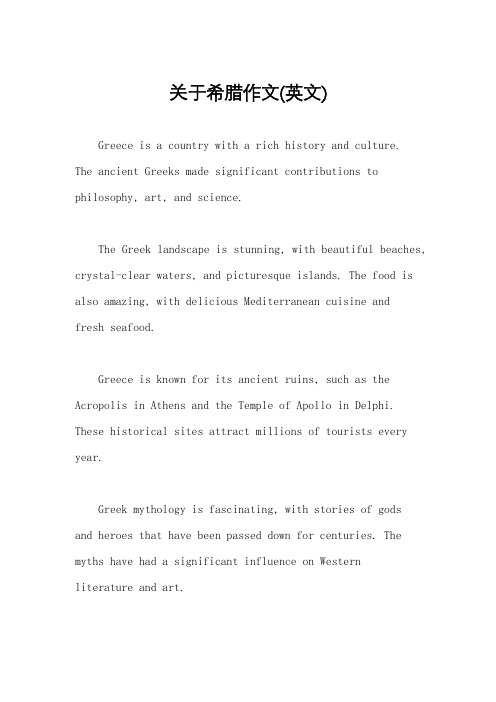
关于希腊作文(英文)Greece is a country with a rich history and culture.The ancient Greeks made significant contributions to philosophy, art, and science.The Greek landscape is stunning, with beautiful beaches, crystal-clear waters, and picturesque islands. The food is also amazing, with delicious Mediterranean cuisine andfresh seafood.Greece is known for its ancient ruins, such as the Acropolis in Athens and the Temple of Apollo in Delphi. These historical sites attract millions of tourists every year.Greek mythology is fascinating, with stories of godsand heroes that have been passed down for centuries. The myths have had a significant influence on Westernliterature and art.The Greek people are known for their warmth and hospitality. They are proud of their heritage and traditions, and they love to share them with visitors.The Greek economy has faced challenges in recent years, but the country is working hard to recover. Tourism and agriculture are important industries for Greece.The Greek language is unique and beautiful, with its own alphabet and rich literary tradition. Learning Greek can open up a whole new world of literature and culture.Overall, Greece is a country with a lot to offer. Its history, natural beauty, and vibrant culture make it atruly special place.。
希腊介绍英文作文
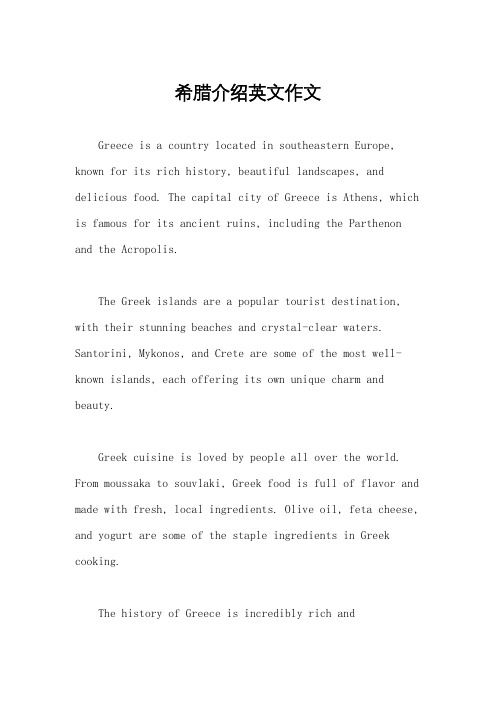
希腊介绍英文作文Greece is a country located in southeastern Europe, known for its rich history, beautiful landscapes, and delicious food. The capital city of Greece is Athens, which is famous for its ancient ruins, including the Parthenon and the Acropolis.The Greek islands are a popular tourist destination, with their stunning beaches and crystal-clear waters. Santorini, Mykonos, and Crete are some of the most well-known islands, each offering its own unique charm and beauty.Greek cuisine is loved by people all over the world. From moussaka to souvlaki, Greek food is full of flavor and made with fresh, local ingredients. Olive oil, feta cheese, and yogurt are some of the staple ingredients in Greek cooking.The history of Greece is incredibly rich andinfluential. It is often referred to as the cradle of Western civilization, as it was the birthplace of democracy, philosophy, and the Olympic Games. The ancient Greeks made significant contributions to art, science, and literature.Greek people are known for their hospitality and warmth. It is common for them to welcome guests with open arms andto share their food and culture with others. Family is very important in Greek culture, and many traditions and customs are centered around family life.The natural beauty of Greece is diverse and breathtaking. From the rugged mountains of the mainland to the picturesque beaches of the islands, Greece offers awide range of landscapes to explore. The country is also home to several national parks and protected areas, which are havens for wildlife and outdoor enthusiasts.。
希腊英文介绍(课堂PPT)
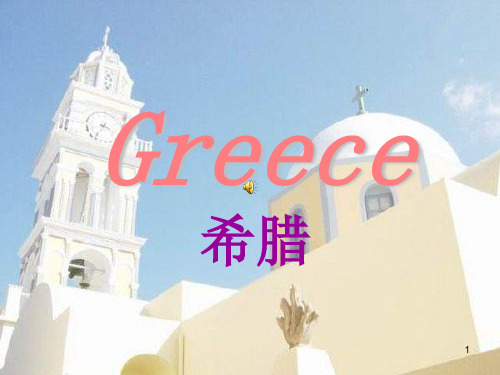
National
• 希腊国旗长方形,长宽之比为3:2。旗面由四道 白条和五道蓝条相间组成。左上方有一蓝色正方 形,其中绘有白十字。九条宽带表示“不自由毋 宁死”,这句格言希腊文共有九个音节。蓝色象
。 征蓝天,白色象征对基督教的信仰
flag
Greece national flag rectangular, length and width ratio of 3:2. The flag consists of four white and five blue and white. There is a blue square in the upper left, which painted a white cross. Ninebroadband said "give me liberty or give me death", this proverb has a total of nine syllablein greek. Blue symbolizes the sky, white is the symbol of the Christian faith.
3
National Emblem
希腊国徽线条简朴流畅,充分体现了人民对基 督的忠诚以及对和平的热爱,希腊国徽的图案 是绿色橄榄枝环绕着一枚兰底白的十字盾徽, 蓝白两色是代表希腊国家的色彩,象征着天水 之间的这块净土,希腊人把橄榄视为和平与智 慧的象征,传说橄榄是希腊人最崇拜的女神雅 典娜所种植,而根据《圣经.旧约全书》记载,橄 榄枝、鸽子是平安、友好和平的使者。
Greece
希腊
1
•Greece is located at the southeast end of Europe and it is the southernmost country of the Balkan Peninsula . [pi'ninsjulə]
介绍希腊历史英文作文

介绍希腊历史英文作文英文,As a history enthusiast, I am fascinated by the rich and complex history of Greece. From the ancient civilization of the Minoans to the classical era of Athens and Sparta, Greece has left an indelible mark on Western civilization.The history of Greece can be traced back to the Bronze Age, with the rise of the Minoan civilization on the island of Crete. The Minoans were known for their advanced architecture, art, and trade, and their influence can be seen in later Greek culture.However, it is the classical era of Greece that is perhaps the most well-known and celebrated. This was a time of great achievements in philosophy, literature, and art, with the likes of Socrates, Plato, and Aristotle shaping Western thought and culture for centuries to come. Thecity-states of Athens and Sparta also played a crucial role in this era, with their military prowess and politicalsystems influencing later civilizations.Of course, no discussion of Greece would be complete without mentioning its mythology, which has captured the imaginations of people around the world. From the epic tales of the Trojan War to the adventures of Odysseus, Greek mythology has become a cornerstone of Western literature and culture.中文,作为一个历史爱好者,我对希腊的丰富而复杂的历史深感着迷。
双语介绍古希腊文明(一)

the Ancient Greek Civilization ( I )古希腊(Greece)是西方文明的源头之一,古希腊文明持续了约650年(公元前800 年-公元前146年),是西方文明最重要和直接的渊源。
Ancient Greece is one of the sources of Western civilization. Ancient Greek civilization lasted about 650 years (800-146 BC), which is the most important and direct source of Western civilization.西方有记载的文学、科技、艺术都是从古代希腊开始的。
The recorded literature, technology and art in the West all started from ancient Greece.古希腊不是一个国家的概念,而是一个地区的称谓。
古希腊位于欧洲的东南部、地中海的东北部,包括希腊半岛、爱琴海和爱奥尼亚海上的群岛和岛屿、土耳其西南沿岸、意大利东部和西西里岛东部沿岸地区。
古希腊是指古代巴尔干半岛南部、爱琴海诸岛和小亚细亚沿岸的总称。
Ancient Greece does not only refer to the country, but the whole region,which was located in the southeast of Europe and the northeast of Mediterranean Sea, including Greek peninsula, archipelagos and islands in Aegean Sea and Ionian Sea, the southwest coast of Turkey, the east coast of Italy and the east coast of Sicily. Ancient Greece refers to the southern Balkans, Aegean islands and the coast of Asia Minor. The Aegean culture from 3000 BC to 2000 BC is the forerunner of its history.peninsula 英[p ninsj l ] 美[p nins l ]noun 半岛an area of land that is almost surrounded by water but is joined to a larger piece of landthe Iberian peninsula (= Spain and Portugal) 伊比利亚半岛archipelago [qki'pel g ] unoun【不规则形式】pl. -os or -oes群岛;列岛;群岛周围的海a group of islands and the sea surrounding themBalkans['bo:lk nz]noun [pl.]巴尔干(位于欧洲东南部,包括萨瓦河和多瑙河以南诸国)a region of SE Europe,including the countries to the south of the rivers Sava and Danube【派生词】Balkan adj. the Balkan Peninsula巴尔干半岛公元前5〜6世纪,特别是希波战争以后,古希腊地区的经济生活高度繁荣、科技高度发达,产生了光辉灿烂的希腊文化,对后世产生深远影响。
关于希腊的英文介绍作文
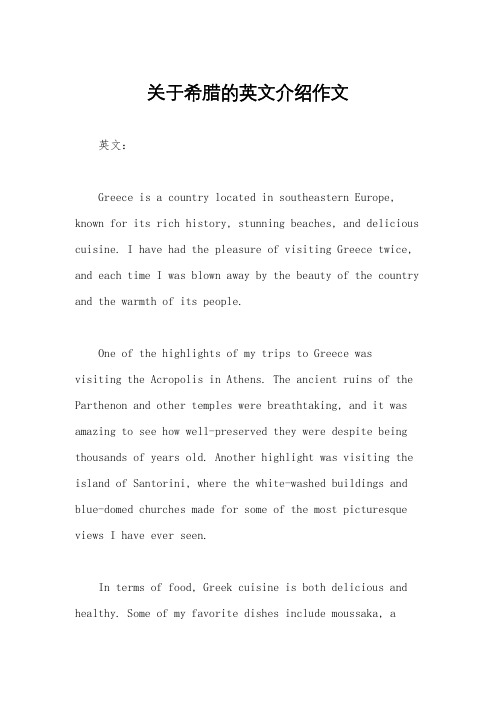
关于希腊的英文介绍作文英文:Greece is a country located in southeastern Europe, known for its rich history, stunning beaches, and delicious cuisine. I have had the pleasure of visiting Greece twice, and each time I was blown away by the beauty of the country and the warmth of its people.One of the highlights of my trips to Greece wasvisiting the Acropolis in Athens. The ancient ruins of the Parthenon and other temples were breathtaking, and it was amazing to see how well-preserved they were despite being thousands of years old. Another highlight was visiting the island of Santorini, where the white-washed buildings and blue-domed churches made for some of the most picturesque views I have ever seen.In terms of food, Greek cuisine is both delicious and healthy. Some of my favorite dishes include moussaka, alayered dish with eggplant, potatoes, and ground meat, and souvlaki, grilled meat skewers served with pita bread and tzatziki sauce. And of course, no trip to Greece would be complete without trying some of the country's famous feta cheese and olives.Overall, Greece is a must-visit destination for anyone interested in history, culture, and natural beauty. The country has something for everyone, from the bustling city of Athens to the serene beaches of the islands.中文:希腊是位于欧洲东南部的国家,以其丰富的历史、迷人的海滩和美食而闻名。
Greece希腊介绍
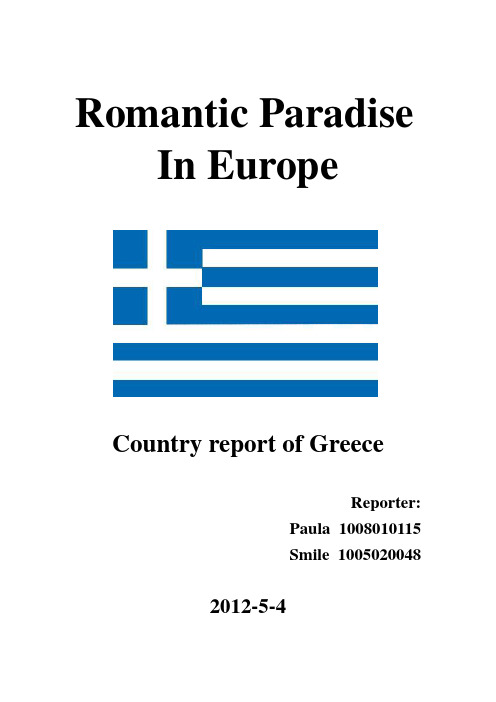
Romantic Paradise In EuropeCountry report of GreeceReporter:Paula 1008010115Smile 10050200482012-5-41.Basic Information(1)Name:The Hellenic Republic(2)Location:Greece is located in the southern end of the Balkans in southeastern Europe, northof the border with Bulgaria, Macedonia and Albania, the eastern border with Turkey and Aegean, and the southwest border with Ionian Sea and the Mediterranean.(3)Symbol:national flagnational emblemnational flower (Olea Europaea)national flag:The flag is composed by nine blue and white strips, and in the upper left hand corner there is a blue square within which a white cross is painted. The nine strips stand for the Greek motto: "Better to die than lose the freedom", which has nine syllables. The color blue on the flag is a symbol of the Christian faithnational emblem:The pattern of the Greek national emblem is a green olive branch surrounding the coat of arms with blue shield and white cross. Blue and white is the symbol colors of Greek, symbolizing this pure land between the sky and water, and the olive is a symbol of peace and wisdom. The simple and fluent lines on the Greek national emblem reflect the people's loyalty to Christ and the love for peace.(4)Natural Feature:The territory is mountainous and there are coastal plains; it is subtropicalMediterranean climate, little change of annual temperature, warm and humid in winter, hot and dry in summer. The average temperature in winter 6 ~ 13 ℃, 23 ~ 33 ℃in summer. (5)Territory:The territory of Greece is 131957 square kilometers, nearly the same size with thatof Anhui province.(6)Population:The population of Greece is 10,787,690, ranking 88th in the world.(7)Official Language:The official language of Greece is Greek, which belongs toIndo-European. Greek is one of the oldest languages in Europe and it once had a great influence on the whole European language.(8)Currency:The currency of Greece is EURO, and Drachma is the former one.(9)Capital:The capital of Greece is Athens, which has the same name of a goddess in Homer’sEpic who encouraged her people and fought with them.(10)N ation:About 98% of the people in Greece is Greek, the others are Turk, Macedonian andBulgarian.(11)S tate Religion:The state religion of Greece is Greek Orthodox. There are also Islam andorthodox Christianity(12)N ational Anthem:The national anthem of Greece is “Hymn to Liberty” , which is the longestnational anthem of the world.2.Brief historyThe Greek civilization was born in 800 BC. At that time, Greece established its own colony on the Mediterranean coast to and resisted the invasion of the Persian Empire.The ancient Greek was a collection of city-states. Greece used to be led by Macedonia andperished the Persian Empire under the leadership of Alexander III. Therewith, Greek culture was spread to Egypt, the Middle East and Central Asia, which known as the Hellenistic Age.Greece was conquered by the Republic of Rome in 168 BC. As a province of the Roman Empire, Greek culture continued to dominate the Eastern Mediterranean and affected people's life in Rome. In 395 AD, the Roman Empire was divided into the Eastern Roman Empire and the Western Roman Empire. Eastern Roman Empire with Constantinople as its center was deeply influenced by Greek culture; it had been resisting the aggression from the East and West for centuries. It didn’t belong to the Ottoman Empire until 1453 AD and the Ottoman Empire gradually conquered the whole of Greece.In 1821, the Greeks declared their independence. After the end of the Greek War of Independence in 1828, Greek monarchy was established in 1833. Throughout the 19th century and early 20th century, Greece continued to territorial expansion, until the Greek territory became what it is today in 1947.Greece announced to join NATO in 1949; the military staged a coup and deposed the king on April 21, 1967; the military regime collapsed in 1974. On June 11, 1975, Greece established the democratic republic. The Constitution provided for the state system as a "presidential parliamentary republic.In 1981, Greece formally joined the European Community (EC)3.Politics & EconomyPolitics:Greece is a parliamentary republic country. President is the head of the country, five years as a term with acceptable reappointment only once. The legislative power of country belongs to the parliament and the president and the executive power belongs to the president and the prime minister and the court handles the judicial power. The modification of the constitution in 1986 adds lots of restraint to the power of the president.The election system in Greece known as Proportional Representation is quite sophisticated. Small parties cannot have much influence. At the same time, the biggest party can control the parliament even though it doesn’t occupy the seats over a half. Every party needs at least 3% votes to hold a seat in the parliament.Economy:Greece joined the Euro-zone on January 1st, 2002.Tourism is the pillar industry, which occupies 15% of the GDP and foreign exchange income of Greece. As a main member that benefits financial aid from European Union (as much as 3% of its GDP), Greece experienced a stable growth in economy in the last few years.The main export commodities: food, beverages, petrochemical products and textiles.The main import commodities: machines, transport equipments, fuels and chemical products. Greece is one of the PIIGS (Portugal, Italy, Ireland, Greece and Spain). The problems need to be solved immediately including: reducing the unemployment rate, preventing the privatization of state-owned enterprises, improving the social insurance system, reforming tax system, and decreasing the deficiency of bureaucratic system.In February 2010, the Greek failure in repaying the debt of 300 billion euros might causebankruptcy, which brought a splash to all the European countries as the crisis of Greece might lead a bad influence on them. Resulting from the lack of diligence, luxurious lifestyle and the immoral way to join euro-zone, Greece caused the crisis of European sovereign debt, which almost disintegrated the euro-zone in 2011.4.Place to goTourism sight in Greece:There are a lot of famous buildings and beautiful tourist destination (scenic spots), many tourist attractions have beautiful or sorrow stories behind them, which make them become more attractive. Autumn is the most suitable (best) season to Greece and it can be really enjoyable to go there between September to October.Athens Acropolis :Athens Acropolis was built in the 5th century BC; it occupies an area of about 4,000 square meters and is 150 meters above sea level. It is the culmination of the ancient Greek architecture and sculpture and it is one of the world's new seven wonders. It is also a symbol of the ancient civilization of Greece and Europe. Acropolis, Greece's most distinguished ancient buildings, is a comprehensive public buildings and the religious and political center.The word “Acropolis” means “city-state on the high hi ll”. Its existing main buildings include the Gate, the Parthenon, the Erik Curtis Dion Temple and the Erechtheum Temple and so on. The Goddess Temple of Athena victory is the oldest building of the city.In ancient Greek mythology, people once set up a new town by the Aegean Sea. Athena and Poseidon both hoped to become the patron saint of this city and they refused to give in. Later, the god king Zeus ruled that the one who give the most useful thing to human beings can own the city. Poseidon gave human beings a strong horse, which is a symbol of the war, while Athena gave them a leafy olive tree symbolizing peace. People yearn for peace not war, and this city finally belongs to Athena. From then on, she became the patron saint of Athens. Later it was put Athens as "peace-loving city."Aegean Sea :Aegean Sea is a symbol of the romantic journey. The coastline of the Aegean Sea is very tortuous and it has a lot of harbors. They are about 2,500 islands, most of them belong to Greece and a small part of them belong to Turkey. The distance can be really short between the islands and you can see everything very clearly in the opposite island at the island you stay.There are many sayings about where the name “Aegean” comes from. Someone says it is a name of a queen who once lived in ancient Aegean and died in this sea at last; others says it comes from a king named Aegean, he thought his son dead and jumped into the sea, killed himself with a broken heart; there is also a saying that the word “Aegean” means wave.Mykonos :The island Mykonos is famous for its dreamy and romantic scenery. The alleyway, the doors and the windows in red, green or blue, the white churches and the white windmills beside the marinamake it the most popular resort island.Mykonos attracts tourists from all over the world. There are many restaurants, bars and stores along the coast and it is called “little Venice”. The beach is a good place for people to swim and sunbathe during the day, the bars and the cafes on the west coastline will become livelier when dusk is coming because tourists can get the best view for watching sunset there.The site of ancient Olympia:The site of ancient Olympia is in the western valley of Peloponnese, north to the Alfios (16 kilometers away from the outfall ), about 190 kilometers west to the capital Athens. It is located in the wooded hills of Cronus and is the Holy Land of ancient Greece.In the tenth century BC, Olympia was a religious center for the worship of Zeus. In addition to the temple, a variety of sports facilities for the Olympic Games is retained here too. From the year of 776 AD, the Olympic Games held every four years in Olympia, and from the 18th century, groups of scholars came here to study and find the ruins of the ancient Olympic athletics relic. In 1766, the British Chandler first discovered the ruins of the temple of Zeus. Since then, a large number of archaeologists and historians from Germany, France and Britain have had a large-scale exploration in Olympia ruins and acquired a large number of precious data of the ancient Olympic athletics relic in 1881. In 1936, after the 11th Olympic Games, the IOC decided to use the balance to continue the exploration of the Olympia ruins and recover the stadium.Olympia created the Olympic Games; it is a symbol of mutual understanding, friendship, solidarity and fair competition.Delphi:Delphi is only two hours’ drive from Athens. It is the mysterious land of Greece and the “centre of the ancient world”. The mysterious Delphi town was p laced on “The world heritage list” in 1987. According to the Greek mythology, in order to make sure the "world center", Zeus released two eagles to let them fly in opposite direction, and the place they meet should be the "world center". He then made his son Apollo to manage the center of the world and gave him a pebble, which made Delphi become the origin of the "oracle". Because of the oracle, Delphi had become a very famous resort where people made pilgrimages. But later Christian rise, oracle activities were banned and the temple was sealed up, Delphi gradually turned into ruins.5.Thing to donumber the windmills:There are five windmills in a small seaside hill in the southwest of Mykonos Island, which is a sign of Mykonos, You can do one very interesting thing on the island, that is to number the windmills. Sitting on the hill with the one you love and number the windmills with him/her in your leisure time, how romantic it is!Visit Athos:Athos is located in the peninsula of Mount Athos in the Greek coast. There are eleven towns and more than 15,000 residents on the island, including more than 900 monks. Dozens of monasteriesin different sizes and styles are built on the hillside.In 1060, Athos developed the law of "the ban on women onto the island". Prohibiting women and even female animals onto the island, the island is also referred to as "The country of men” by the Greeks, even the photographs and drawings of women or women’s daily necessaries are not allowed to be brought to the island.Athos is free from the Greek law and directly charged by the monastery. It is the only place that has hierarchism and abstinence life. 900 monks of intellectual breadth are sent to the island as soon as they are born. They have never seen women, radios, televisions, telephones, musical instruments or newspapers in their life and are not allowed to sing or smoke.6.CultureThe prosperity of Greece has once created its splendid ancient culture. On the basis of the extensive absorption of cultures in west Asia and Egypt, the ancient Greeks made a creative contribution to mathematics, astronomy, medicine, architecture, sculpture, drama, poetry, philosophy, history, elocution etc.Food & DrinkAs part of the Greek culture, the Greek food has a history of 4000 years and famous for its healthy diets. However, along with the increase of their incomes, the Greeks are gradually changing their traditional diet structure. Traditional Greeks eat much more fish, fruits and vegetables than meat. But modern Greeks like eating meat much more than before. More meat and fast food are making more and more obese people.A .OliveThe Greeks began to plant olives early on. They use them directly or as a minor ingredient of the main meal or cook food with their oil. The rate of heart disease in Greece is low.B .FetaFeta is a kind of white saline cheese; it looks a little bit like tofu, more like the Greek yogurt. People use ewe’s milk to make feta traditionally, but now milk is also used in many places. Feta is the most proud food of the Greeks, which can be eaten as an appetizer, snacks and staple food materials etc. The EU even sets the rule that only the Greek feta is the genuine one.C.Greek saladIt is made mainly of several fruits and vegetables. Black olives and feta are the supplementary raw materials.D .The Greek roast lambThe lamb chop is very fresh and tender and the flavor of goat is covered by the minor ingredient.E .Chicken spinach pieIt is a kind of light food without salt. You can feel very full after eating it.酥皮包里裹着鸡肉菠FishBecause Greece is pretty close to the Mediterranean, the Greeks like eating fish very much, like codfish, lobster, crab, unagi, snapper, mullets, shrimp and squid.DrinkIce water with lemon accompanies every meal in Greece. Many people enjoy strong coffee or strong tea, too. Adults may drink Greek wines or colorless ouzo.“Ouzo”Ouzo is also known as “anisette”. It is a kind of alcoholic beverage which you can only find in Greece. The alcoholicity of Ouzo is about 40% and it is made from grapes, pepper, fennel and other fruits and seeds with good smell. Add some ice water to Ouzo and it will turn into oyster white, like the spirit of ancient Greece. To the Greeks, drinking ouzo is an art and a way of life. The EU has also officially recognized ouzo as a Greek specialtyGreek wineGreece is not only one of the oldest wine production places, but also the oldest hometown of vineyards in Europe. There is a "Wine Festival" in Greece every year, when everyone will get together and enjoy the carnival time.DressingThe ancient dressing of Greece was made of rectangular fabrics without any clipping or seaming. People used pins and bands and bounded the fabrics on their bodies, creating a special style of “invisible form”. The main types are: doricchiton, ioricchiton, chlamys, pelops.PhilosophyThe Greek philosophy is the origin of western philosophy, the word "philosophy" came from the ancient Greek word “philo —sophia”, meaning love wisdom. For the Greek people, wisdom is not a perceptual knowledge, but the knowledge about the reason and principle of things.OlympicsThe Greeks made the tradition of holding sports meeting every four years in Olympia in 776 BC. During the games, the Greek players and the nearby people got together in the beautiful town——Olympia, which is located in southern Greece. Although military had been imprinted to the ancient Olympic sports, the games itself may be the big event that brought all the Greeks together.7.My opinion on this countryIn my opinion, Greece is a peaceful and romantic country. It is a place that has a long history and rich culture which makes it always seems peaceful and quaint. What’s more, it’s beautiful scenery and magnificent structures make it one of the most famous tourist attractions in the world.I love Greek blue and white houses and the blue sea most, and I’d love to go there with my family and enjoy the beautiful scenery on the beach one day. That will definitely be a wonderful experience in my life.。
英语介绍古希腊文化的作文
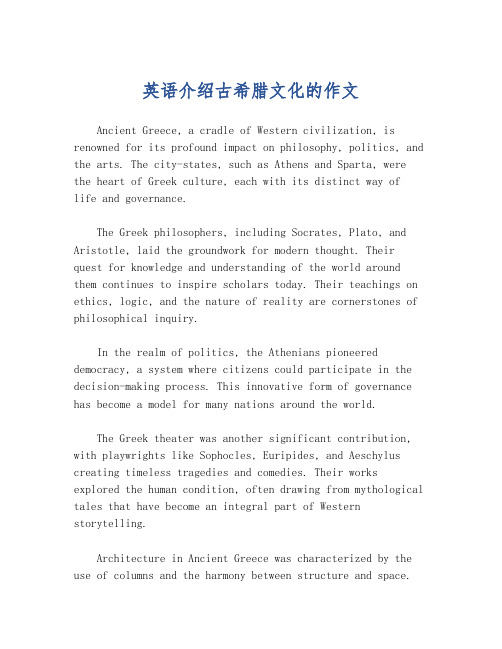
英语介绍古希腊文化的作文Ancient Greece, a cradle of Western civilization, is renowned for its profound impact on philosophy, politics, and the arts. The city-states, such as Athens and Sparta, were the heart of Greek culture, each with its distinct way oflife and governance.The Greek philosophers, including Socrates, Plato, and Aristotle, laid the groundwork for modern thought. Their quest for knowledge and understanding of the world around them continues to inspire scholars today. Their teachings on ethics, logic, and the nature of reality are cornerstones of philosophical inquiry.In the realm of politics, the Athenians pioneered democracy, a system where citizens could participate in the decision-making process. This innovative form of governance has become a model for many nations around the world.The Greek theater was another significant contribution, with playwrights like Sophocles, Euripides, and Aeschylus creating timeless tragedies and comedies. Their works explored the human condition, often drawing from mythological tales that have become an integral part of Western storytelling.Architecture in Ancient Greece was characterized by the use of columns and the harmony between structure and space.The Parthenon, standing on the Acropolis in Athens, is a prime example of this, with its elegant Doric columns and intricate friezes.The Olympic Games, which originated in Greece, were a celebration of athletic prowess and a symbol of peace. Athletes from across the region would gather to compete in various sports, fostering a spirit of camaraderie andfriendly rivalry.Greek mythology, with its pantheon of gods and goddesses, heroes and monsters, has captured the imagination of generations. These stories, filled with drama and moral lessons, have influenced literature, art, and even modern-day movies and television.The legacy of Ancient Greece is a testament to the enduring power of ideas and creativity. Its contributions to knowledge, governance, and culture continue to resonate, shaping the world we live in today.。
希腊神话介绍(英文版)
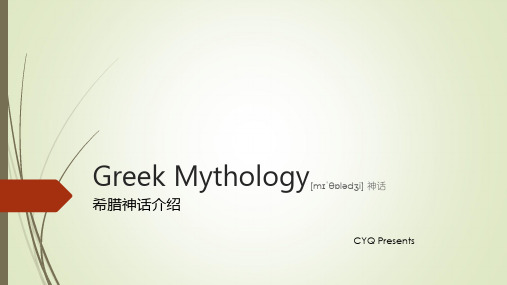
Origins of the world and the gods
The world began with Chaos, a yawning nothingness(什么都没有). Out
of the void emerged(出现) Gaia (the Earth) and some other primary
The story of Hades and Persephone 3/7
When Demeter learned of this, she was furious. She began to search for her daughter all around the world. Demeter was so sad and forgot to give fertility(肥) to the earth which caused a great dearth(饥荒) to fall upon the earth.
希腊文化演讲稿英语范文
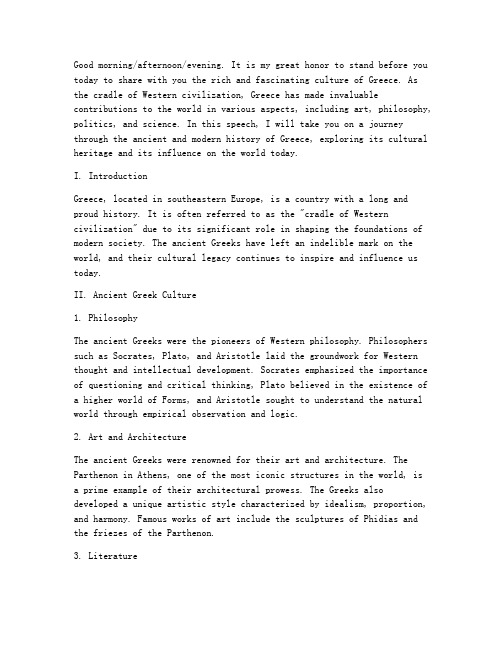
Good morning/afternoon/evening. It is my great honor to stand before you today to share with you the rich and fascinating culture of Greece. As the cradle of Western civilization, Greece has made invaluable contributions to the world in various aspects, including art, philosophy, politics, and science. In this speech, I will take you on a journey through the ancient and modern history of Greece, exploring its cultural heritage and its influence on the world today.I. IntroductionGreece, located in southeastern Europe, is a country with a long and proud history. It is often referred to as the "cradle of Western civilization" due to its significant role in shaping the foundations of modern society. The ancient Greeks have left an indelible mark on the world, and their cultural legacy continues to inspire and influence us today.II. Ancient Greek Culture1. PhilosophyThe ancient Greeks were the pioneers of Western philosophy. Philosophers such as Socrates, Plato, and Aristotle laid the groundwork for Western thought and intellectual development. Socrates emphasized the importance of questioning and critical thinking, Plato believed in the existence of a higher world of Forms, and Aristotle sought to understand the natural world through empirical observation and logic.2. Art and ArchitectureThe ancient Greeks were renowned for their art and architecture. The Parthenon in Athens, one of the most iconic structures in the world, isa prime example of their architectural prowess. The Greeks also developed a unique artistic style characterized by idealism, proportion, and harmony. Famous works of art include the sculptures of Phidias and the friezes of the Parthenon.3. LiteratureGreek literature has a long and esteemed tradition. Homer's epic poems, the Iliad and the Odyssey, are among the earliest works of Western literature and continue to be celebrated for their timeless themes and poetic beauty. Other notable Greek writers include Aeschylus, Sophocles, and Euripides, who are known for their tragedies.4. SportsThe ancient Greeks were passionate about sports, and the Olympic Games were born in Greece. The first Olympic Games took place in 776 BC in Olympia, and they were held every four years to honor the god Zeus. These games were not only a showcase of athletic prowess but also a way to foster peace and unity among the Greek city-states.III. Modern Greek Culture1. LanguageGreek is the official language of Greece and is spoken by approximately 13 million people worldwide. It is an Indo-European language and has a rich history of its own. Modern Greek has evolved from Ancient Greek, and it has borrowed words and influences from various languages over the centuries.2. CuisineGreek cuisine is famous for its simplicity, flavor, and health benefits. Olive oil, olives, lemon, and herbs are some of the key ingredients in Greek dishes. Famous Greek foods include moussaka, souvlaki, and baklava.3. Music and DanceGreek music and dance are an integral part of the country's cultural heritage. Traditional Greek music is characterized by its distinct rhythms and melodies, often accompanied by instruments such as the bouzouki and the bagpipes. Greek dance, such as the sirtaki and the zeibekiko, is a lively and energetic expression of cultural identity.4. Literature and TheaterModern Greek literature and theater have continued to thrive. Greek authors such as Nikos Kazantzakis and Elena Cousta have gained international acclaim for their works. Greek theater, particularly the work of playwrights like Costa-Eftihia Tsatsoulis and Iannis Ritsos, has also made a significant impact on the global stage.IV. ConclusionGreece's cultural heritage is a testament to the ingenuity andcreativity of its people. From the ancient philosophers and artists to the modern musicians and writers, Greece has contributed immensely to the world's cultural tapestry. As we celebrate the beauty and richness of Greek culture, let us also recognize the timeless lessons and values it continues to impart to us all.Thank you for your attention.。
希腊英文介绍(3篇)

希腊英文介绍(3篇)以下是网友分享的关于希腊英文介绍的资料3篇,希望对您有所帮助,就爱阅读感谢您的支持。
希腊英文介绍篇一CulturePhilosophyMain article: Ancient Greek philosophyAncient Greek philosophy focused on the role of reason and inquiry. In many ways, it had an important influence on modern philosophy, as well as modern science. Clear unbroken lines of influence lead from ancient Greek and Hellenistic philosophers, to medieval Muslim philosophersand Islamic scientists, to the European Renaissance and Enlightenment, to the secular sciences of the modern day.Neither reason nor inquiry began with the Greeks. Defining the difference between the Greek quest for knowledge and the quests of the elder civilizations, such as the ancient Egyptians and Babylonians, has long been a topic of study by theorists of civilization.LiteratureMain articles: Ancient Greek literature, Greek tragedy, Greek comedy, and Theatre of ancient GreeceAncient Greek society placed considerable emphasis upon literature. Many authors consider the western literary tradition to have begun with the epic poems The Iliad and The Odyssey, which remain giants in the literary canon fortheir skillful and vivid depictions of war and peace, honor and disgrace, love and hatred. Notable among later Greek poets was Sappho, who defined, in many ways, lyric poetry as a genre.A playwright named Aeschylus changed Western literature forever when he introduced the ideas of dialogue and interacting characters to playwriting. In doing so, he essentially in vented ―drama‖: his Oresteia trilogy of plays is seen as his crowning achievement. Other refiners of playwriting were Sophocles and Euripides. Sophocles is credited with skillfully developing irony as a literary technique, most famously in his play Oedipus the King. Euripedes, conversely, used plays to challenge societal norms and mores—a hallmark of much of Western literature for the next 2,300 years and beyond—and his works such as Medea, The Bacchae and The Trojan Women are still notable for their ability to challenge our perceptions of propriety, gender, and war. Aristophanes, a comic playwright, defines and shapes the idea of comedy almost asAeschylus had shaped tragedy as an art form—Aristophanes’ most famous plays include the Lysistrata and The Frogs.Philosophy entered literature in the dialogues of Plato, who converted the give and take of Socratic questioning into written form. Aristotle, Plato’s student, wrote dozens of works on many scientific disciplines, but his greatest contribution to literature was likely his Poetics, which lays out his understanding of drama, and thereby establishes the first criteria for literary criticism.Science & T echnologyMain articles: List of Graeco-Roman geographers, Greek astronomy, Greek mathematics, Medicine in ancient Greece, and Ancient Greek technologyAncient Greece mathematics contributed many important developments to the field of mathematics, including the basic rules of geometry, the idea of formal mathematical proof, and discoveries in number theory, mathematical analysis, applied mathematics, and approached close to establishing the integral calculus. The discoveries of several Greek mathematicians, including Pythagoras, Euclid, and Archimedes, are still used in mathematical teaching today.The Greeks developed astronomy, which they treated as a branch of mathematics, to a highly sophisticated level. The first geometrical, three-dimensional models to explain the apparent motion of the planets were developed in the 4th century BC by Eudoxus of Cnidus and Callippus of Cyzicus. Their younger contemporary Heraclides Ponticus proposed that the Earth rotates around its axis. In the 3rd century BC Aristarchus of Samos was the first to suggest a heliocentric system, although only fragmentary descriptions of his idea survive.[18] Eratosthenes, using the angles of shadowscreated at widely-separated regions, estimated the circumference of the Earth with great accuracy.[19] In the 2nd century BC Hipparchus of Nicea made a number of contributions, including the first measurement of precession and the compilation of the first star catalog in which he proposed the modern system of apparent magnitudes.The Antikythera mechanism, a device for calculating the movements of planets, dates from about 80 B.C., and was the first ancestor of the astronomical computer. It was discovered in an ancient shipwreck off the Greek island of Antikythera, between Kythera and Crete. The device became famous for its use of a differential gear, previously believed to have been invented in the 16th century, and the miniaturization and complexity of its parts, comparable to a clock made in the 18th century. The original mechanism is displayed in the Bronze collection of the National Archaeological Museum of Athens, accompanied by a replica.The ancient Greeks also made important discoveries in the medical field. Hippocrates was a physician of the Classical period, and is considered one of the most outstanding figures in the history of medicine. He is ref erred to as the ―father of medicine‖[20][21][22] in recognition of his lasting contributions to the field as the founder of the Hippocratic school of medicine. This intellectual school revolutionized medicine in ancient Greece, establishing it as a discipline distinct from other fields that it had traditionally been associated with (notably theurgy and philosophy), thus making medicine a profession.[23][24]Art & ArchitectureMain articles: Art in ancient Greece and Architecture of ancient GreeceThe art of ancient Greece has exercised an enormousinfluence on the culture of many countries from ancient times until the present, particularly in the areas of sculpture and architecture. In the West, the art of the Roman Empire was largely derived from Greek models. In the East, Alexander the Great’s conquests initiated several centuries of exchange between Greek, Central Asian and Indian cultures, resulting in Greco-Buddhist art, with ramifications as far as Japan. Following the Renaissance in Europe, the humanist aesthetic and the high technical standards of Greek art inspired generations of European artists. Well into the 19th century, the classical tradition derived from Greece dominated the art of the western world.Religion & MythologyMain articles: Ancient Greek religion, Hellenistic religion, and Greek mythologyGreek mythology consists of stories belonging to theancient Greeks concerning their gods and heroes, the nature of the world and the origins and significance of their religious practices. The main Greek gods were the twelve Olympians, Zeus, his wife Hera, Poseidon, Ares, Hermes, Hephaestus, Aphrodite, Athena, Apollo, Artemis, Demeter, and Hades. Other important deities included Hebe, Helios, Dionysus, Persephone and Heracles (a demi-god). Zeus’ parents were Kronos and Rhea who also were the parents of Poseidon, Hades, Hera, Hestia, and Demeter.希腊英文介绍篇二Sappho .The Alexandrians included her in the list of nine lyric poets. Her birth was sometime between 630 and 612 BCE, and it is said that she died around 570 BCE, but little is known for certain about her life. The bulk of her poetry, which was well-known and greatly admired through much of antiquity, has been lost, but her immense reputation hasendured through surviving fragments. Sappho’s lifetime witnessed a period of political turbulence on Lesbos and saw the rise of Pittacus. According to the Parian Marble, Sappho was exiled to Sicily sometime between 604 BCE and 594 BCE and Cicero records that a statue of her stood in the town-hall of Syracuse. Unlike the works of her fellow poet, Alcaeus, Sappho’s surviving poetry has very few allusions to political conditions. The principal exception is Fragment 98, which mentions exile and indicates that Sappho was lacking some of her customary luxuries. Her political sympathies may have lain with the party of Alcaeus. Though there is no explicit record of this, it is usually assumed that Sappho returned from exile at some point and that she spent most of her life in Lesbos.David Campbell has briefly summarized some of the most arresting qualities of Sappho’s poetry Clarity of language and simplicity of thought are everywhere evident in our fragments; wit and rhetoric, so common in English love-poetry and not quite absent from Catullus’ love poems, arenowhere to be found. Her images are sharp —the sparrows that draw Aphrodite’s chariot, the full moon in a starry sky,the solitary red apple at the tree-top—and she sometimes lingers over them to elaborate them for their own sake. She quotes the direct words of conversations real or imaginary and so gains immediacy. When the subject is the turbulence of her emotions, she displays a cool control in their expression. Above all, her words are chosen for their sheer melody: the skill with which she placed her vowels and consonants, admired by Dionysius of Halicarnassus, is evidenced by almost any stanza; the music to which she sang them has gone, but the spoken sounds may still enchant. Out of over 200 remaining remnants of Sappho’s poetry, Fragment 16 and Fragment 44 in particular are considered lyric retellingsof Homer epics, as Sappho was known to be very familiar with Homer’s poems. Both fragments make direct allusions to scenes in Homer’s Iliad , while Sappho also expands them with her own narrative illustrations. Fragment 16, for instance, serves to characterise Helen, a key figure of Homer’s, while Fragment 44 glorifies domestic joy by depicting the events leading to the wedding of Hector and Andromache.The politi cal atmosphere of the Lesbos during Sappho’stime paralleled that of Homer’s Troy, as the cities of Lesbos were constantly plagued with threats from Lydia. Whereas Homer focused depicting beauty through the glory of militarism, however, Sappho focused primarily onthe portrayal of beauty through love. As oratory poets, both Homer and Sappho used their work to celebrate and memorialise events for posterity. The exigency of their verses was therefore to preserve information as well as to entertain.希腊英文介绍篇三DramaOrigin: perform plays at religious festivals.Develop: in the 5th century B.C. a powerful drama developedStates: open-air theatres, audience sat on stone benches and looked down at the stage from three sides, actors wore masksTragedyAeschylus (525 — 456 B.C.)Works: Prometheus Bound, Persians, and Agamemnon Inthese plays there are only two actors and a chorus. Yet they manage to stir and move the audience deeply by showing heroes and heroines in complicated human situations, out of which there is no escape but death. The play are written in verse. Aeschylus is noted for his vivid character portrayal and majestic poetry ComedyAristophanes (about 450 --- 380 B.C.) Works: Frogs, Clouds, Wasps and Birds These plays are loose in plot and satirical in tone.HistoryHerodotus希罗多德(484 --- 430 B.C.) ―Father of History, he wrote about the wars between Greeks and Persians. His history, full of anecdotes and digressions and lively dialogue, is wonderfully readable. He kept alive many traditional stories, which were not always accurate. His object in writing was ―that the great and wonderful deeds done by Greeks and Persians should not lack renown.Homer ( probably lived around 700 B.C.)Two epics: LliadOdysseusThey are about great men and wars of a remoter age,probably in the period 1200—1100B.CPhilosophy and ScienceThe ancient Greeks were curious about many things, including what made the universe. They had the spirit of free enquiry and were quite ready to drop established ideas, to speculate, to use their imagination and to form their own conclusions. They were also not afraid to speak their minds. Pythagoras 毕达哥拉斯(about 580 --- 500 B.C.) had the idea that all things were number. Heracleitue 赫拉克利特(about 540 --- 480 B.C.) believed fire to be the primary element of the universe He also said: You cannot step twice into the same river. The sun is new everyday Democritus 德谟克利特(about 460 --- 370 B.C.) speculated about the atomic structure of matter. He was one of the earliest exponents of the atomic theory.Socrates苏格拉底( about 470 --- 399 B.C.)The dialectical method --- method of argument, by questions and answers. Greek philosopher who initiated a question-and-answer method of teaching as a means ofachieving self-knowledge. His theories of virtue and justice have survived through the writings of Plato, his most important pupil. Socrates was tried for corrupting the minds of Athenian youth and subsequently put to death (399).Plato 柏拉图( about 428 ---348 B.C.)Men have knowledge because of the existence of certain general ―idea‖, like beauty, truth, goodness. Only these ―ideas‖ are completely real, while the physical world is only relatively real. For this reason, Plato‘s philosophy is called Idealism.(唯心主义) Greek philosopher. A follower of Socrates, he founded the Academy (386), where he taught and wrote for much of the rest of his life. Plato presented his ideas in the form of dramatic dialogues, as in The Republic. Aristotle 亚里士多德Greek philosopher. A pupil of Plato, the tutor of Alexander the Great, and the author of works on logic, metaphysics, ethics, natural sciences, politics, and poetics, he profoundly influenced Western thought. In his philosophical system theory follows empirical observation and logic, based on the syllogism三段论, is the essential method of rational inquiry.ScienceEuclid 欧几里得(约公元前3世纪的古希腊数学家) is even now well-known for his Element《几何原本》, a textbook of geometry, perhaps the most successful textbook ever written, because it was in use in English schools until the early years of the 20th century.Archimedes 阿基米德(287—212 B.C.) did important work not only in geometry, but also in arithmetic, machanics, and hydrostatics. ―Give me a place to stand, and I will move the world.‖ Greek science did not neglect ap plication. Mathematics, the purest of sciences, was applied in at least five fields: acoustics, optics, geography, statics and astronomy. Greek scientists collected a wealth of material and enquired into the proper method of doing scientific work. As a result, they were able to deduce theories and built up systems, which had a tremendous influence on later scientists.Greek MythologyGreek Mythology is a group of traditional tales told by the ancient Greeks about the deeds of gods, heroes and theirrelations with human beings.Its great influence upon the English language and literature is beyond description. A great number of words and idioms in the English language come from the Greek mythology.Godsthe old theogony : the Tians(旧神谱:奥林匹斯十二泰坦)the new theogony : the Gods (新神谱奥林匹斯十二主神)Heros——Perseus (珀尔修斯) Jason (伊阿宋) Heracles (赫拉克勒斯) Theseus (忒修斯) Monsters——Medusa(美杜莎) Minotaurus (米诺陶洛斯) Cerberus (刻耳柏洛斯)T oday we mainly want to talk about the Olympians.Zeus 宙斯Father of Gods and men the god of sky and thunderZeus is the ―Father of Gods and men‖ who rule the Olympians of Mount Olympus as a father rule the family. He is the god of sky and thunder in Greek mythology. However, he is known for his erotic escapades. These resulted in many godly and heroic offspring, including Athena, Apollo and so on.Apollo 阿波罗God of sun, healing and truth.One of Apollo’s most important daily tasks is to harness his chariot with four horses and drive the sun across the sky. During the day he drove his carriage of gold and ivory , and brought light , life and love to the great world below . Late in the afternoon he came to the end of his journey in the far western sea and got on his golden boat to return to his eastern homeAthena 雅典娜Goddess of wisdom, victory and war Athena is fierce and brave in battle but, only wars to defined the state and home from outside enemies. She is the goddess of the city, handicrafts, and agriculture. She invented the bridle, the trumpet, the flute, the pot, the plow, the yoke, the ship, and the chariot. She is the embodiment of wisdom, reason, and purity.Prometheus 普罗米修斯He was a champion of mankind, known for his wily intelligence, who stole fire from Zeus and gave it to mortals. Zeus then punished him for his crime by having him bound to a rock while a great eagle ate his liver every day only to have it grow back to be eaten again the next day. His myth has been treated by a number of ancient sources, in whichPrometheus is credited with –or blamed for –playing a pivotal role in the early history of mankind.。
Greece(希腊简介)
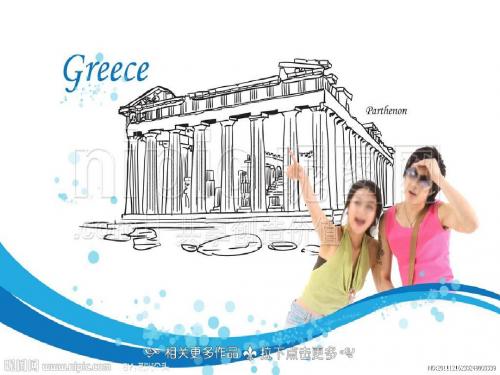
• Greek mythology comes from Greek literature and geometric art works in BC 900 to 800 years . • Greek mythology is a large collection of stories, started in Ancient Greece, about the beginning of the world, and the lives and adventures of gods, goddesses, heroes, and heroines. • The Twelve Olympians are the most important gods of Greek mythology, who lived on top of Mount Olympus.
you are not you the tighter allowed to take hold ,the more photos randomly friendly you are in Greece
something related to sex
thank you for your attention
one of the world's oldest cities, with its recorded history spanning around 3,400 years. Classical Athens was a powerful city-state. A centre for the arts, learning and philosophy, home of Plato's Academy and Aristotle's Lyceum
- 1、下载文档前请自行甄别文档内容的完整性,平台不提供额外的编辑、内容补充、找答案等附加服务。
- 2、"仅部分预览"的文档,不可在线预览部分如存在完整性等问题,可反馈申请退款(可完整预览的文档不适用该条件!)。
- 3、如文档侵犯您的权益,请联系客服反馈,我们会尽快为您处理(人工客服工作时间:9:00-18:30)。
2
Tips
Other information ——Travel note
• The jet lag:6 hours Slower than China • The exchange rate:1 RMB = 0.1438 euros • Hotel check-in time is 14: 00 • Voltage 220 V, frequency 50 HZ,Due to the power socket is different, need a socket adapter
2
Tips
Etiquette— —The Greek social etiquette
• 4. W h e n ca llin g G re e c e , w e n e e d to p a rtic u la r ca s e is p a rtic u la r tre a tm e n t . F o r a c q u a in ta n c e s , it ca n b e d ire c tly to ca ll h is n a m e . F o r e ld e rs , yo u r re s p e c tfu l n a m e sh a ll b e ta k e n .
Greece
Ελληνικ Δημοκρατα
holy
quiet
fancy
1
Visa ☞
If yo u re a lly m u s t le a v e a n d h a v e th e re s o u rc e s to d o so , g o to th e c o u n try o f yo u r ch o ic e o n a to u ris t v is a .
consumption
The credit card ☞
Mobile phone ☜
Small change ☞
Drug ☜
daiy necessities ☞
2
Tips
Best travel time— — April to June& September to October
2
Tips
airline
2
Tips
airline
• Eleftherios Venizelos International Airport • Athens
2
Tips
language
• Official language—— Greek • Gernal language—— French + English
2
ps
Etiquette— —The Greek social etiquette
• W h e n d e a lin g w ith o u ts id e rs , g re e k s te n d to sh o w th e fo llo w in g fo u r ch a ra c te ris tic s —— • 1. T h e g re e k s , w h e n d e ali n g wit h a str a n g e r , w ill b e fra n k , p o lite a n d frie n d ly . A t th e sa m e tim e , th e y a re o fte n e a s y to e m o tio n a l , o fte n h a v e q u a rre ls w ith o th e rs .
The Aegean sea
3
Map
Olympia Athens
2
Tips
Etiquette— —The Greek social etiquette
• 3.In G re e c e , th e p e o p le o f th e m o s t u s e d m e e tin g e tiq u e tte is th e h a n d s h a k e a n d h u g . T h e fo rm e r is a p p lic a b le to th e g e n e ra l situ a tio n , th e la tte r m o re th a n se e n in b e tw e e n frie n d s a n d re la tiv e s . • W h e n kis s in g , g re e k s g e n e ra lly is n o t d is tin g u is h b e tw e e n m e n a n d w o m e n .
2
Tips
Etiquette— —The Greek social etiquette
• 2. G re e k s w ill b e ve ry sin c e re w h e n g u e s ts . S o m e tim e s , th e ir g e n e ro s ity ca n le t a p e rs o n h a rd to b e lie v e , still ca n le t a g u e s t e v e n d id n 't kn o w w h a t to d o .
